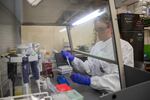Many families are hitting the road across the Northwest this week, crisscrossing the Cascades and traveling up and down Interstate 5 in search of family, turkey and pumpkin pie.
And many will have Fido there, wedged in the back with the suitcases and the cooler holding the green bean casserole.
But Northwest veterinarians are suggesting leaving your dogs at home this year: Don’t bring them to family gatherings with other dogs, and maybe don’t drop them at the kennel.
A mysterious disease has been making dogs sick across the Northwest and the nation.

A mysterious disease in dogs is sickening hundreds of animals across the country, and killing some. That could be problematic this week as many people leave their animals in boarding facilities, or travel with their dogs to gather with family.
Anna King / Northwest News Network
It starts like a mild case of kennel cough, then develops into pneumonia-like symptoms. Some animals have died. And scientific labs aren’t sure what they’re dealing with yet. Bacteria? A virus? Something else?
“The scary part, I think, is just not knowing what this disease is really,” Minden Buswell, a veterinary epidemiologist with the Washington State Department of Agriculture. “It’s not responsive to antibiotics right now, the kind of antibiotics that we’re using. We need to know what this disease is, and how best to treat it – knowing that our current treatments aren’t working.”
Buswell said it’s best to keep dogs away from areas where they might congregate with other canines, like communal dog bowls and dog parks and kennels.
“I was talking to some boarding facilities and recommending that they really up their biosecurity,” she said.
She recommended cleaning more, making sure all dogs have up-to-date vaccines and minimizing the time that dogs interact with each other.

Ella Reese, a scientist at the Oregon Veterinary Diagnostic Laboratory, at work under a safety hood.
Courtesy of the Oregon Veterinary Diagnostic Laboratory
Pandemic for dogs
“I think what’s interesting to me – not that we need it coming out of COVID – but the reminder that the diseases are dynamic,” said Kurt Williams, the director of Oregon Veterinary Diagnostic Laboratory at the Carlson College of Veterinary Medicine at Oregon State University. “And it’s a reminder of why the Oregon Veterinary Diagnostic Laboratory is here. And that is to address the known and unknown diseases that can crop up at any time.”
Williams said this shouldn’t be underestimated, it is a sort of a COVID-like pandemic for dogs – a devastating disease.
How many dogs have been affected by this ailment is largely unknown, but hundreds of suspected cases are cropping up in Oregon, especially in the Portland area and Willamette Valley. There are more suspected cases across the country, but currently, none so far have been reported in Washington.
Officials with Oregon’s Department of Agriculture said they are aware of other cases, including in New Hampshire and nearby northeastern states, as well as in Colorado, Indiana, Illinois, and California.
The cases reported to ODA appear to primarily fall within three general categories, according to staff at the agency:
- Chronic mild-moderate inflammation of the trachea and lungs with a prolonged duration (six to eight weeks or longer) that is minimally or not responsive to antibiotics;
- Chronic pneumonia that is minimally or not responsive to antibiotics; and
- Acute pneumonia that rapidly becomes severe and often leads to poor outcomes in as little as 24 to 36 hours.
ODA officials said they are working with reporting veterinarians and specialists at OSU’s Carlson College of Veterinary Medicine, the Oregon Veterinary Diagnostic Laboratory and the U.S. Department of Agriculture’s National Veterinary Services Laboratory to find out what’s causing these cases.

The Oregon Veterinary Diagnostic Laboratory is housed in Magruder Hall on the Oregon State University campus in Corvallis, Oregon.
Courtesy of the Oregon Veterinary Diagnostic Laboratory
Vulnerable to misinformation
Williams said he’s worried about misinformation on this disease, since sick dogs are an emotional topic. He said he’s been contacted already by many people who have heard misinformation about the subject.
“Because of the emotional ties we have to dogs, people (can) become emotionally paralyzed in this process,” he said. “I hope they’ll pursue answers to this disease by relying on reputable journalistic sources and scientific experts that are speaking to those experts.”
Williams encouraged people who are having trouble with their pet’s health to call the vet. But, in the unfortunate case that someone’s dog dies of the disease, Williams said he hopes the owner considers donating the body to science.
“I do think it’s going to be very important to study animals that died of this entity to link what we see, happening in the tissues of the animals that we think we might have this disease,” he said, “Linking that back to how the animal became sick and how that animal became sick clinically — and we don’t have that yet.”
Both Williams and Buswell stressed that so far no known cases have transferred to humans.